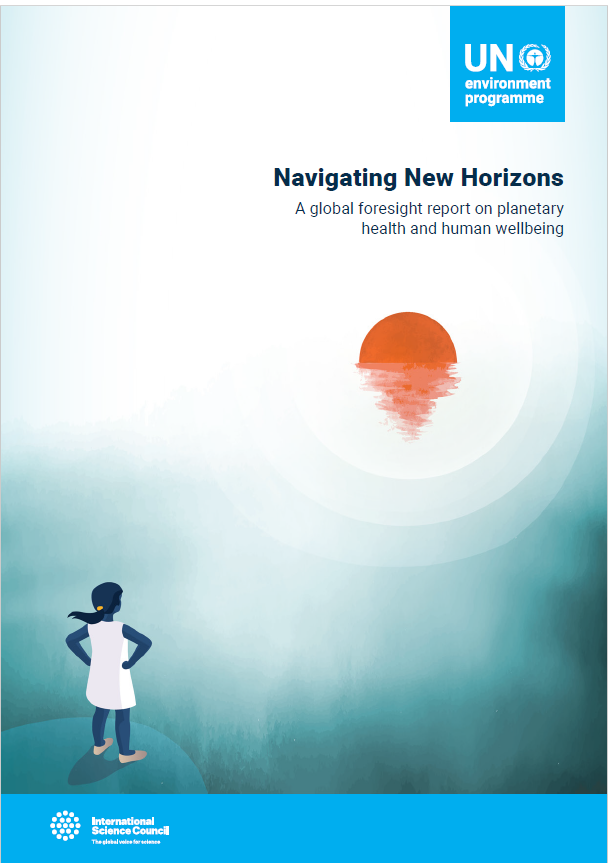| dc.contributor | Executive Office | en_US |
| dc.contributor.author | United Nations Environment Programme | en_US |
| dc.contributor.author | International Science Council | en_US |
| dc.contributor.other | Jabbour, Jason | en_US |
| dc.coverage.spatial | Global | en_US |
| dc.date.accessioned | 2024-07-09T06:24:01Z | |
| dc.date.available | 2024-07-09T06:24:01Z | |
| dc.date.issued | 2024-07 | |
| dc.identifier.isbn | 978-92-807-4166-7 | en_US |
| dc.identifier.other | EO/2655/NA | en_US |
| dc.identifier.uri | https://wedocs.unep.org/20.500.11822/45890 | |
| dc.description | To help navigate current and future uncertainty and disruptive change, while effectively delivering on its mandate, UNEP has been implementing an institutionalized approach to strategic foresight and horizon scanning with the view to developing an anticipatory and future-oriented culture.
This mirrors the growing interest and demand for foresight that is also reinforced by the United Nations reform agenda and the Secretary-General’s report on ‘Our Common Agenda’, which calls for all UN agencies, as well as all UN member states, to engage foresight practices more deeply and apply the derived insights to address global systemic risks.
This process has culminated in the development of the present report “Navigating New Horizons – A Global Foresight Report on Planetary Health and Human Wellbeing”, produced by UNEP in collaboration with the International Science Council. The report calls for the world to pay heed and respond to a range of emerging challenges that could disrupt planetary health and wellbeing. It presents insights on eight critical global shifts that are accelerating the triple planetary crisis of climate change, biodiversity and nature loss and pollution and waste.
Eighteen signals of change – identified by hundreds of global experts and distilled through regional and stakeholder consultations that included youth – offer a glimpse into potential disruptions, both positive and negative, that the world needs to keep a watching brief on. The report outlines how to create an enabling environment for better decision-making by creating a new social contract, embracing agile and adaptive governance, and increasing integrated accessible data and knowledge.
The report offers a stark reminder of the interconnectedness and fragility of our systems in the 21st Century and warns that prioritizing short-term gains over anticipatory action and preparedness jeopardizes long-term prosperity and planetary health. However, it also points to the tremendous potential and human ingenuity that can be leveraged in the spirit of discovery and cooperation to deliver solutions across the triple crisis.
The outcomes of the report will be integrated into UNEP’s strategic planning, potentially influencing the next UNEP Medium-Term Strategy, presenting an opportunity to consider expanding programmes in areas like artificial intelligence, new technology, and robotics in agriculture, prompting discussions on the level of engagement in these issues. This will ultimately serve UNEP in adopting a proactive posture and modernize tools for efficiency and cost savings. | en_US |
| dc.format | pdf | en_US |
| dc.language | English | en_US |
| dc.publisher | United Nations Environment Programme | en_US |
| dc.rights | Public | en_US |
| dc.subject | zoonotic disease | en_US |
| dc.subject | antimicrobial resistance | en_US |
| dc.subject | chemical | en_US |
| dc.subject | space debris | en_US |
| dc.subject | artificial intelligence | en_US |
| dc.subject | digital technology | en_US |
| dc.subject | solar radiation | en_US |
| dc.subject | biological agent | en_US |
| dc.subject | displaced persons | en_US |
| dc.subject | conflict | en_US |
| dc.subject | fossil fuel | en_US |
| dc.subject | corruption | en_US |
| dc.title | Navigating New Horizons: A global foresight report on planetary health and human wellbeing | en_US |
| dc.type | Publications | en_US |
| dc.type | Reports, Books and Booklets | en_US |
| wd.identifier.sdg | SDG 3 - Good Health and Well-being | en_US |
| wd.identifier.sdg | SDG 9 - Industry, Innovation and Infrastructure | en_US |
| wd.identifier.sdg | SDG 10 - Reduced Inequalities | en_US |
| wd.identifier.sdg | SDG 16 - Peace, Justice and Strong Institutions | en_US |
| wd.topics | Chemicals and Pollution Action | en_US |
| wd.topics | Digital Transformations | en_US |
| wd.topics | Finance and Economic Transformations | en_US |
| wd.topics | Science-Policy | en_US |
| wd.identifier.pagesnumber | 108 p. | en_US |
| wd.identifier.doi | https://doi.org/10.59117/20.500.11822/45890 | |


